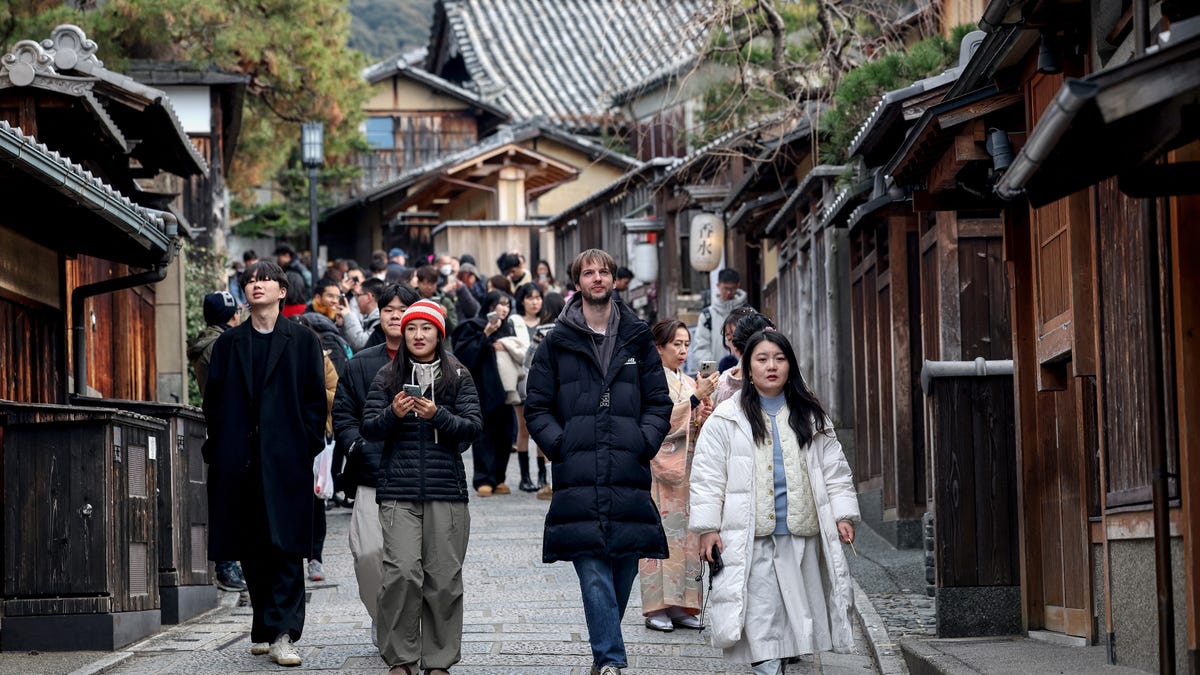Shitty headline writing strikes again.
“900%” is both a sensationalist way of describing it, and also even applicable to the overwhelming majority of visitors.
Yeah, it’s a hotel tax and scales with the price of the hotel. The top end (for hotel over $665 a night) is a 10% tax.
also I’ll throw in that because the yen is so weak vs the dollar at the moment (hence the overtourism), $665 a night is in of itself understating the kind of place we’re talking about. ¥100,000 in 2012 was $1,300. Minimum wage is ¥1,000/hour.
I just had a quick search on a bookings site, and 80 out of the 103 five-star hotels in Kyoto are under that threshold, and of those, 40 are under $350. If you’re being hit by the top rate then the place you’re staying in is bougie as f.
Also also, my reading of it is that it isn’t a 10% tax, it’s a stepped tax equal to 10% of the bottom of its bracket, i.e. it’s ¥10,000 regardless of whether your room was ¥100,000 or ¥300,000.
OP’s “Tourists in Kyoto will soon face a 900% increase in a tax” summary would be more accurately stated as “Tourists staying in one of Kyoto’s 23 most expensive hotels, will face a 9 percentage point increase in tax”.
10%, that’s a large difference than 900%. This is one of the times I came to the comments to see if the article is worth reading, now I guess I have to to figure out the fuck they meant
It was 1%. 1% to 10% is in fact a 900% increase, it just sounds a lot scarier than it actually is.
Yeah, it was definitely a get readers attention scare tactic. 10% tax on hotels is nothing.
It’s like saying “We had to raise our taxes to match that of Florida districts due to federal cuts by Trump”
Sensationalism, but some may be more true than others
What*
You could read the article.
Sir/ma’am I’m from reddit, change is hard and scary
No shit, what else would I have meant?
All that’s gonna do is get you the biggest D bag tourists
Read the article, the 900% increase is only for the most expensive rooms.
Yep the biggest douches in the USA have lots of money.
It’ll keep out most of the weebs though
From 1% to 10%. In the case of hotels over 665 USD per night. Fucking clickbait, man.
yea + milk those rich people
They work better as revenue generators than as actual deterrents to tourism.
Places that experience over-tourism generally need tax revenue to fix issues like lack of affordable housing, or raising pay for municipal workers that provide services that arent important to tourists and only matter to locals
If they wanted to simply deter tourism then they could just close hotels, ban air bnbs, etc. The point is to still have tourism but check its growth against the strangulation effect it has on local life
They don’t actually want to deter it, they want to pay for its harmful impacts.
Do you want rich, entitled, assholes everywhere? That’s how you get rich, entitled, assholes.
But this tax only affects top hotels
They’ve already gottem. This is how you squeeze the juice.
I find that a bit funny given that in the last 15 years or so Japan has officially done a lot to attract tourists. Wanting to become a tourist destination, branding themselves as a place for holidays. I’ve seen so many “Visit Japan” campaigns, usually sponsored by the Japanese government, in the last decade or so. I get that it sucks for the people living in those cities and good for them that their city council does something to help, it still feels weird after years and years of campaigns to attract more tourists to Japan.
I think they should keep up the tourism campaigns, but they need to focus them on areas other than Kansai and Tokyo.
There’s so many great place all over Japan, but of course most flights are into Kansai or Narita airport, so naturally people are going to look for attractions and accommodation nearby. There are many international airports, but they are of course only available from closer east Asian Countries, but that does make up the bulk of the tourist population (half of all tourists are from China, Korea or Taiwan), so advertising those cities heavily would be a good start - “Come to Miyajima, we don’t speak Mandarin, but we’ve got 50 varieties of mandarins!”
A big issue in my view is the increase in cost of the JR rail pass and the price of and difficulty to navigate shinkansen in general. A cool campaign would be a free/cheap train ticket from Tokyo to the north, or Osaka to the west included with your international plane ticket.
Also, I believe Chinese driving licenses aren’t valid in Japan, because of the IDP requirement - if the biggest tourist demographic could hire cars and go off the beaten track, that might distribute the crowds a bit.
Pretty clear sign of at least one division in their national and local interests, I’d say. 🤌🏼
deleted by creator
You know the saying, 600 years ago was the best time to build more golden pagodas if you wanted them today, but the next best time is today if you want 600 year old golden pagodas in 600 years.
Of course, then you’d have debates over which was the OG golden pagoda from olden times? Which one’s by the ancient spring bathhouse and which one’s sponsored by crypto? Which one’s “real” historical architecture and which one’s overdone post-modern style? Etc.
Sounds like that would draw even more tourists to come and see all of them and have that debate, better start building even more golden pagoda’s to account for the extra extra tourists.
They just want to cash in more. Let’s face it, the city likes tourist revenue and felt like they could get more.
And good for them to do it. Tourism causes a lot of negative externalities; this tax helps mitigate some of those externalities.
I live in Orlando, so I feel the pain of over tourism, even though I love our visitors (I really do, a good part of business is derived from tourists). At least visitors to Florida know that there is cool stuff all over the state, so even if they spend most of their vacation in Orlando, they still go out to the coasts, or to Miami, etc.
Japan has done a great job of attracting people to their country, now they just have to do a better job of getting them to spread out.
now they just have to do a better job of getting them to spread out.
They have that problem with their own population.
I’m aware. I keep seeing stories about how cheap land and housing is in the rural areas. Great houses just sitting empty. It’s starting to attract Americans.
Yikes, someone I know was planning on going in may. Wonder if this will affect their decision.
I was there over the summer.
There was a heat wave and I came down with a respiratory infection that really hit me when I got to Kyoto.
I spent three days in bed then forced myself to walk to Nijo ji castle because I wanted to see it. I have never in my life come so close to actual heat stroke. Vietnam and Thailand felt positively balmy in comparison.
Anyway Nino ji castle and surroundings were pretty cool in spite of the fact that I nearly cooked myself. I don’t know if I can recommend Kyoto or not outside of that since most of my time there was spent locked in a hotel room coughing and wishing I was dead. They do have solid Uber Eats options though. And I learned how to say “the door is closing” in Japanese from riding the elevator up and down to get my Uber Eats, which is cool I suppose.
Yeah, I’m not going. I wasn’t gonna go. But I’m definitely not going now.
I highly recommend visiting Kyoto despite these news. The city is absolutely beautiful and well worth the tourist tax. I hadn’t experience any prejudice there as a tourist and the local generally like foreigners.
You can also avoid the tax with a day trip as Kyoto is right next to Osaka which is quite cheap.
The overtourism issue is mostly entirely a skill issue as it’s free income that can be controlled through tourist taxes like this one. So this tax is fundamentally a good thing.
Never been to Japan, I think Japan is an interesting place, kinda wanna visit someday, but I have the impression that Japan is kinda Sinophobic, not sure if that’s the propaganda or if its real, but given its a homogenous society, I would not be surprised if Sinophobia is still a thing. Japan still haven’t really apologized for WW2 and the invasion of China and various Asian countries. I saw photos of some stores in Japan having a sign that says “Chinese people and dogs not allowed” or something vile, idk I’m kinda scared.
It could just be the childhood conditioning that caused me to have this subconcious fear, I really don’t know.
Idk…
I do have a US passport so I could just use English, learn like a few Japanese phrases, and never speak a word of Mandarin and they might not notice my ethnicity… 🤷♂️
It’s called “passing” or even “masking”, and people’ve been doing it before time began. I’m genuinely sorry that’s a thing, though. 🙇🏽♂️
Can’t say I’ve seen anything of sorts personally but I’m generally an average tourist. Loads of Chinese tourists as well that seem to be doing just fine.
I’ve heard of all sorts of stories about Japanese hate for tourists but Japan is huge and after visiting for years I’ve had only 1 discrimination experience.
You’re probably seeing some of the oversensationalized ultranationalist garbage coming from that loud minority (and their loudspeaker vans), as some of the supposed incidents involving Mainlander tourists are isolated cases. That afaik there are fewer “locals-only” izakaya and exist only in rural areas or lesser known urban areas (but even then you’ll have to look out for some pushy touts and bars charging too much for anything on the menu).
You should be fine using other guides to know where better to go to, such as Atlas Obscura.
I will support any policy that fights over tourism.
You should never feel like a foreigner in your own hometown, a tourist should never cause displacement of locals
What. You don’t like feeling as if you’re in a fishbowl that people buy tickets to come tap on the glass and watch you do you stuff? 🤷🏼♂️
We need this here too. We can’t just depend on tourism.















